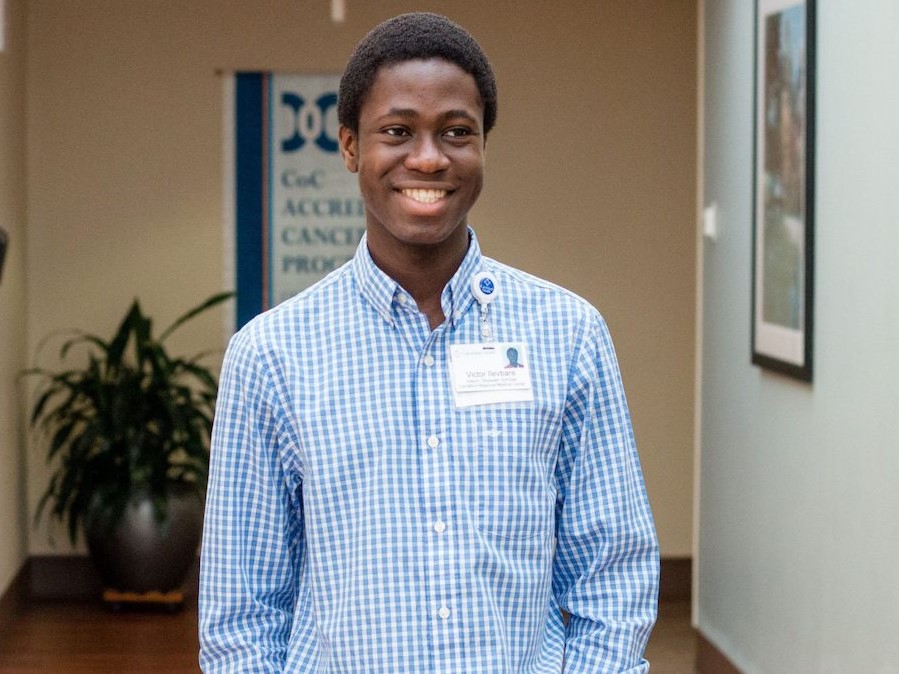Carolina junior Victor Ilevbare has been through an epidemic and a pandemic, both of which informed his interest in medicine.

It took one public health crisis to convince Victor Ilevbare that he wanted to help fight infectious diseases. It took another before he actually could.
The 20-year-old Carolina junior was only 14 when his town in Nigeria experienced an Ebola outbreak, forcing his family to quarantine indoors for several months. “It was really stressful because you have to be careful in all you do,” he said.
Sitting still became Nigerians’ way of combatting Ebola, but Ilevbare chafed under all of that inaction. “I sat down, and I couldn’t do anything when this major disease plagued my entire country,” he said.
Now, Ilevbare — who is majoring in biology and chemistry — wants to become an infectious disease physician so he’ll be on the frontlines of the next battle. After Carolina, he hopes to attend medical school. “Infectious diseases are constantly evolving, and I want to be that physician who is a detective and able to solve them,” he explains.
Before he jumps into the fight as a doctor, Ilevbare is already doing what he can to help slow the spread of COVID-19 in North Carolina as part of the Carolina COVID-19 Student Services Corps. The group of students work on various service opportunities related to COVID-19 relief on campus and in Chapel Hill. “It’s pretty much a way that I can get engaged and give back to my community,” he explains. “And it’s a way I can actually do something because I couldn’t do anything about the Ebola outbreak.”
He was recently promoted to testing lead with the Carolina COVID-19 Student Services Corps. Now, when he volunteers at the Carolina Together Testing sites every week, he makes sure the larger team has what it needs to be successful and is quick to answer participants’ questions about testing procedures and COVID-19.
Ilevbare isn’t waiting until med school to dive into the field. During the summer of his sophomore year, he interned at a hospital in Gastonia, North Carolina. Instead of working with one unit, he asked if he could observe a little of everything. “I saw a woman give birth and a couple of c-sections,” he says. “The cancer department made me cry.” Although the experience was hard at times, he knew it was the right path. It reinforced his calling to “join health care workers and try as much as possible in every way I can to help people.”
He has never like sitting on the sidelines — he prefers being part of the action. He learned that discipline while attending Catholic boarding school in Nigeria, and it went on to inform his larger mission to do. “I want to help people in any possible way I can.”
His big-heartedness and tenacity keep him busy. He’s not content with the bare minimum; instead, he looks for ways to participate. “There’s so much out there that could be done,” he says. “If no one does it, who will?” This semester, Ilevbare has a full course load, plays recreational soccer once a week and participates in an array of volunteer work. Besides the Carolina COVID-19 Student Services Corps, he’s also part of the Biology Ambassadors Program.
Part of his drive stems from wanting to make his father proud. Ilevbare’s father passed away one year after his family moved to the U.S. in 2016. The pain of that loss stays with him, and helping others has been one way to process his grief.
Another way turned out to be poetry. Although Ilevbare prefers math and science classes, he took a poetry class as part of his general education requirements. He found it helped him talk about all he’d been through — Ebola, losing his father and, as the oldest child, taking on the responsibility of caring for his family.
“It was a way to share what I have,” he says. “Sometimes it’s so frustrating to have all this buried because everyone sees you and thinks, ‘He’s gotten to this point,’ or ‘He has everything.’ But they don’t know the background of what I’ve been through.”
For someone who has already experienced so much hardship at such a young age, Ilevbare’s attitude and outlook are striking. But he learned early on that you don’t achieve success at the exclusion of others. “I try to be selfless and generally be a nice individual,” he says. “I see that as the driving force as being successful in life.”
As a Tar Heel, Ilevbare channels those experiences — both good and bad —to achieve his future medical goals and give back to people who need his help now.
By Amanda Wicks, University Communications
